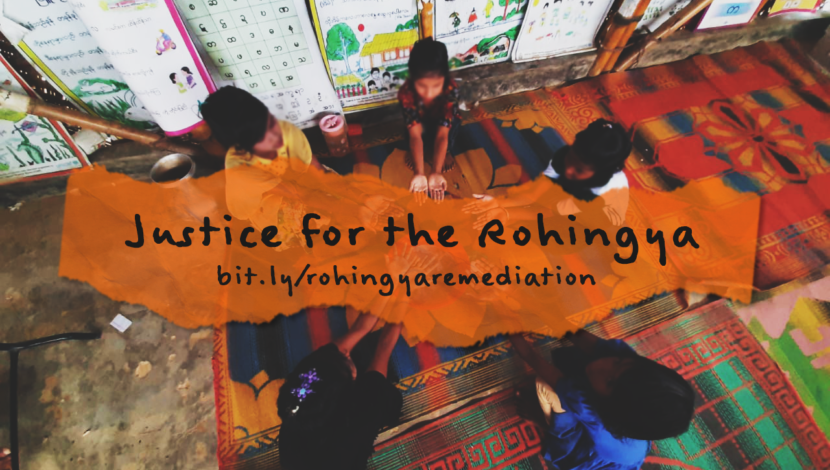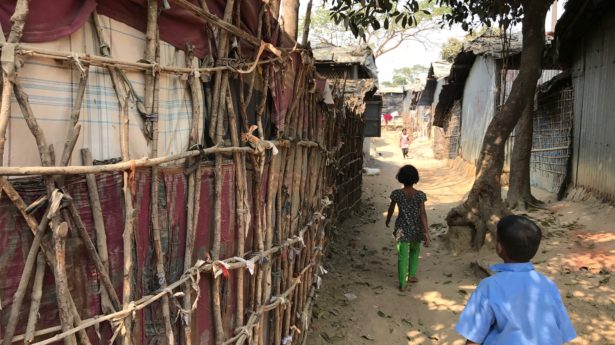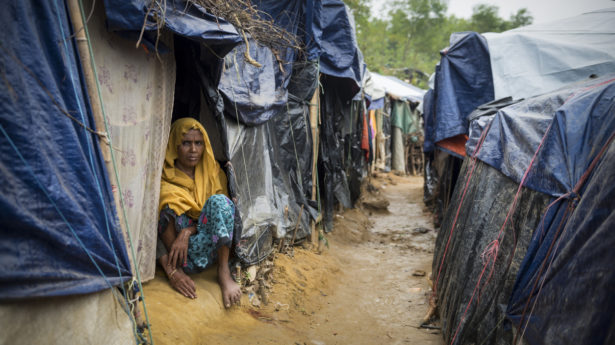The Unitarian Universalist Service Committee advances human rights through grassroots collaborations.
Rohingya Youth Demand Justice From Facebook

By Mike Givens on December 9, 2021
UUSC’s history is rooted in coming to the aid of those needing support, particularly communities that are facing a disproportionate amount of oppression. Since 2013, Facebook’s platform has been consistently used in Burma (Myanmar) to share racist and hateful speech aimed at the Rohingya people. During this time, Facebook failed to adequately moderate content inciting people to violence.
In 2017, Myanmar’s military, the Tatmadaw, began a campaign of extreme and systematic violence against the Rohingya. Facebook hosted the military’s official page, did not remove posts made by Tatmadaw officials promoting the campaign, and allowed content which dehumanized, degraded, and encouraged violence against the Rohingya to remain online and be widely shared. The ethnic cleansing campaign displaced hundreds of thousands of Rohingya people, mostly into Bangladesh. To learn more about the Rohingya living in the Cox’s Bazar refugee camp, click here.
More than four years later, there are still several million Rohingya people living in exile, mostly in refugee camps in Bangladesh. These camps are often crowded and lack basic amenities and resources like quality healthcare, jobs, and housing. The refugees living in these camps are, in effect, living in poverty.
On Thursday, December 9, 16 Rohingya youth from refugee camps in Bangladesh filed a complaint with the Irish Organisation for Economic Co-operation and Development (OECD) National Contact Point, detailing Facebook’s reticence to work collaboratively to provide access to educational resources for Rohingya youth living in Cox’s Bazar refugee camp, Bangladesh.
Rohingya youth and young adults are living in Cox’s Bazar refugee camps without a proper education, without a proper life. There are half a million Rohingya youth and young adults who do not have any access to formal education.
They have the talent but many of them are sitting idly, doing menial work. The desperate situation in the camp puts young people—particularly young women—at a high risk of being trafficked. There is a great risk of an entire generation of young people sinking into ignorance.
Some NGOs and Rohingya community-based groups have projects in place to support the Rohingya youth living in the camps. In 2018, some Rohingya youth came forward to establish schools inside shanties in the refugee camps with Myanmar books and education materials. These schools need financial support and certification to run effectively. Technical education classes in the camps can support adolescents and youths in becoming skilled and employable; currently, there is no capacity to start technical education classes in the schools.
Education is important for everyone. Rohingya children are consistently denied this right. The loss of access to education for a generation of Rohingya youth will only hurt their futures.
James Douglas of UUSC partner Victim Advocates International (VAI), a membership organization for victims of serious international crimes, including crimes against humanity and genocide, and a lawyer representing the Rohingya, said that Facebook has yet to fully take responsibility for their actions.
“Facebook’s breaches of the OECD guidelines contributed to the human rights violations to which the Rohingya suffered in 2017, and as such they have a duty to provide a remedy,” said Douglas, who is based out of Ireland. “Repeatedly, we have seen that Facebook has failed to act when it knows that its platform is harmful, and this pattern applies to what happened in Rakhine state.”
Sayed Ullah, 19, a community leader in a Bangladesh refugee camp, spoke passionately about his resolve to hold Facebook accountable.
“The contributions of Facebook have created hell for us,” he said. “Rohingya younger generations are growing up without a formal education. Accepting or rejecting our offer is up to Facebook.
“I will not give up, I will fight and will inspire people continuously to fight against the human rights violations of Facebook.”
Photo Credit: Muhammed Nowkim

